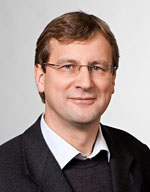Prof. Dr. Martin Zacharias

James-Franck-Str. 1
85748 Garching Germany
Tel: +49 (0) 89/289-12335
Email: Martin.Zacharias@ph.tum.de
Web: www.t38.physik.tu-muenchen.de/
Research themes
Projekt C05
Simulation der Dynamik und Deformierbarkeit von Nukleinsäuren bei Proteinbindung und Schadenserkennung
Schäden in DNA werden durch Reparaturenzyme oft indirekt durch eine sequenz- oder schadensspezifische Deformierbarkeit der DNA erkannt. In den geplanten Simulationsstudien sollen mögliche Deformationen von DNA durch Moleküldynamiksimulationen systematisch untersucht werden. Dabei soll die globale Struktur eines DNA-Segments durch Vorgabe der helikalen Geometrie der angrenzenden DNA-Bereiche systematisch variiert werden. Die damit verbundenen Änderungen der freien Energie sollen durch Umbrella-Sampling-Simulationen berechnet werden. Darüber hinaus soll auch die Kinetik von Konformationsänderungen durch gewichtete Ensemble-Simulationen studiert werden. Als Modellsysteme dienen geschädigte DNA-Moleküle, die von den Reparaturenzymen MutM, XPA/Rad14 und Photolyasen erkannt werden und experimentell im SFB749 untersucht werden.
Project C05
Simulation of nucleic acid dynamics and deformability during protein binding and damage recognition
DNA damage is often recognized by an indirect readout mechanism of repair enzymes without formation of direct contacts with the repair enzyme. In the Molecular Dynamics simulation studies we plan to systematically investigate the deformability of DNA. This will be achieved by deforming the DNA along helical variables by restraining the terminal segments of a DNA in certain geometry. Combined with the Umbrella Sampling method it is then possible to extract free energy changes along helical and global variations of the DNA structure. In addition, we plan to employ weighted ensemble simulations to study the kinetics of conformational changes in nucleic acids and peptides. As model systems it is planned to use damaged DNA molecules recognized by repair enzymes MutM, XPA/Rad14 and Photolyases investigated experimentally in the SFB749.


